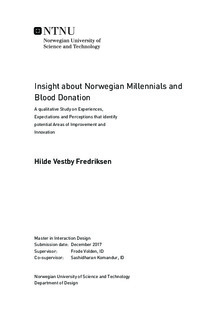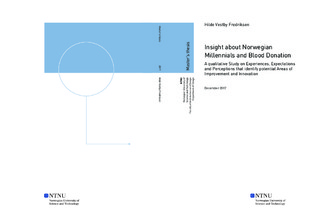| dc.description.abstract | Norway needs more blood donors to increase the preparedness. With the decreasing number of blood donors, the preparedness situation is put in danger if catastrophes or epidemics should occur. Research about how blood donation should be organized exists, but often lack user-centricity when approaching the problem.
This thesis offers an exploratory and problem identifying contribution to this problem. A qualitative and user-centred approach was taken, where 18 young adults who both are and are not blood donors took part in an in-depth interview. The interviews gave insight about experiences, expectations and perceptions about blood donation and how blood donation is organized.
The aim of this study is to provide insight about challenging areas that can be useful for further research and guidance for decision making for further development in the service offered by the blood banks, so that future services better could meet user needs and expectations.
The overall findings of this thesis suggest that:
- User-centred research was suitable to identify perceptions, experiences and expectations about challenging areas in a (potential) role as a blood donor.
- Information and knowledge about blood donation is low and not very present in the participants life.
- Everyday factors like planning, combining blood donation with work or studies, and finding an appointment that fits the schedule can be challenging as a (potential) blood donor. An extended list of such challenges is presented in this thesis.
- Technology such as an app and mobile notifications could possibly make it easier to plan and keep track of appointments.
- The findings in this study expressed both positive and negative aspects about blood donation in Norway. The negative aspects are about low visibility and practical issues in general. Positive aspects are about helping others, feeling appreciated, that it is a good concept, professional and friendly staff, not time consuming, and receiving gifts. | |

